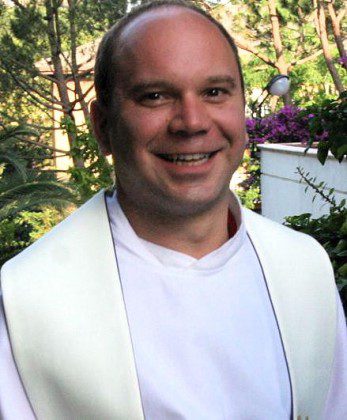Housed within the same building as the SCJs’ Generalate in Rome is the International College. The name is a bit of a misnomer for Americans who generally think of a “college” as a secondary school. While students who are members of the International College attend classes, they do so off-site, generally at one of the pontifical universities in Rome.
Directed by Fr. Luigi Mostarda, SCJ, the International College hosts SCJ students from around the world.

At the end of the recent academic year the college produced “Il Nostro Frutto,” a publication that profiled several students in the community. Among those featured: Fr. David Szatkowski, SCJ, who recently returned to the United States after five years with the International College. A doctoral candidate in Canon Law, Fr. David will reverse roles in September when he begins teaching duties at Sacred Heart School of Theology.
Fr. David has a licentiate in Canon Law and will defend his doctoral thesis in fall.
The following is the Q and A with Fr. David that appeared in “Il Nostro Frutto:”
Q: How do you feel after completing your dissertation?
A: Being in Rome was a great experience for me. Most importantly, it gave me an international experience of the congregation. But after five years, I am happy to return to the United States.
Q: What was your greatest challenge during the five years?
A: I was the only student at the International College from an English-speaking country. The ideal would have been to have more people who spoke my first language, which allows you to share some experiences more easily.
Q: What was the focus of your Canon Law studies?
A: I focused on the authority of an ordinary –– a provincial superior and/or superior general –– in a religious institute of pontifical right to restore justice in cases of children who have been sexually abused by religious. As Dehonians, we are to be in service of justice, justice to people. But in doing so, we must not confuse “justice” with “vengeance.” We must focus on reconciliation. Canon Law seeks to help Church authorities restore a relationship and communion with a person –– both victims and violators of the law.
Q: What theory of law has helped you in particular?
A: The Code of Canon Law, reformed by John Paul II, is always at the heart of my research. The concept of “communion,” which I used frequently in my work, I got from Eugene Corecco, a canon lawyer in Switzerland. However, the most important theory for my thesis was developed by Robert Schreiter, an American. His research and writings on the ministry of reconciliation, Christ’s mission to reconcile God with humanity, I believe to be important and useful for canonists also. Speaking to the task of creating an encounter between the victim and the offender, he points a way for us to find a way to restore both victim and offender to a new humanity.
Q: What were your conclusions?
A: Canon Law leaves the door open, so to speak. There is certainly the objective fulfillment of the law to restore justice. However, no two situations are identical and therefore the law prefers to leave the door open for adaption to various situations.
Q: What was the greatest challenge in your research?
A: It was emotional. When I researched the story of abused children I was angry. It is a crime against nature! And this, in my opinion, is part of why the justice of law cannot be an emotional action. What did Jesus say after the crucifixion? “Peace be with you.” It is not because Jesus was not angry. But he moved beyond his own anger. The world of revenge is focused on the concept of an ear for an ear, an eye for an eye, a hand for a hand. Jesus came precisely to change this; we, as lawyers, need to put aside our emotions. When the law is violated, when there is a violation against a child of God, the goal must not be to justify the violation but instead to find the balance between justice and God’s mercy. This is because both the offender and the victim need to be seen as children of God.
Q: Many say that the law is very dry and rigid. What do you say?
A: I often joke that the law exists to “protect the faithful from their crazy pastors.” The law always seeks to find the right balance between the duties and the rights of all. The law in the Church is a reflection of our dogma, morality and spirituality. The changing world situation of today is not that of yesterday, so the law must be a breathing, living thing. We must look to new situations in the world.
Q: You have studied at the Angelicum. What is your impression?
A: It is very important to understand the philosophy of the law because this is fundamental to a correct interpretation of the law.
“The Christian faithful are those who, inasmuch as they have been incorporated in Christ through baptism, have been constituted as the people of God. For this reason, made sharers in their own way in Christ’s priestly, prophetic, and royal function, they are called to exercise the mission which God has entrusted to the Church to fulfill in the world, in accord with the condition proper to each.” [Code of Canon Law Can. 204 – § 1]

